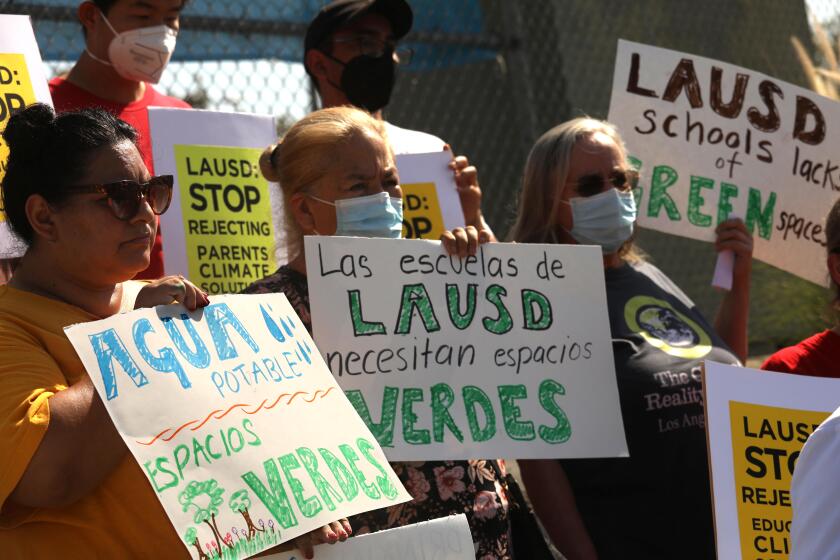Newsletter: Paris shone as an Olympic host. Will L.A. be ready for its 2028 closeup?

- Share via
Good morning. It is Wednesday, Aug. 14. Here’s what’s happening in Opinion.
The Summer Olympic Games that ended Sunday showcased the magic of Paris. From screens across the world, viewers could see people strolling alone the Seine River, bicycling on tree-lined boulevards and seated at outdoor cafes that spilled onto the city’s car-free streets. Iconic landmarks, such as the Eiffel Tower and Palace of Versailles, loomed over beach volleyball, skateboarding and equestrian events. It was beautiful, like a series of video postcards from Paris to the world.
So what will the world see in Los Angeles in 2028?
If it’s anything like the short segment during the closing ceremonies, well, the world will see a fake L.A. temporarily gussied up for the occasion. The LA28 organizing committee had a film crew install a replica lifeguard stand and faux palm trees along the sand in Long Beach, passed off as Venice, to create the backdrop for performances by the Red Hot Chili Peppers, Billie Eilish and Snoop Dogg and Dr. Dre.
Hopefully this isn’t a sign of what’s to come. Paris leaders used the Olympics as the impetus to transform their urban landscape. Leading up to the games the city built miles of new bike lanes to connect to Olympic venues and barred cars from newly pedestrianized streets. Those are permanent change that have made the center of Paris quieter, cleaner and easier to get around without a car.
Mayor Karen Bass has said her top priority is ensuring Angelenos benefit from the 2028 Games with lasting environmental and transportation improvements throughout the city. She’s promoted a car-free Olympics, with spectators taking public transit to events. That’s a good start. But Bass and other L.A. leaders need to move fast and be ambitious.
I want to see more street trees, public garbage cans that get emptied regularly, clean, modern bus shelters, protected bike lanes that connect to destinations, and more murals and housing. Lots more housing. What do you want to see? What projects and investments should Bass and L.A. leaders prioritize to make Los Angeles a more livable and beautiful city — for more than just two weeks in the summer of 2028? Send your thoughts to letters@latimes.com.
This is what makes JD Vance’s attempt to ‘swift-boat’ Tim Walz’s military service so pathetic. Columnist Robin Abcarian asks: “Are we really going to allow Republicans — who are freaking out now that their presumed glide path back to the White House has become a very bumpy road — to slime Walz the way they slimed Vietnam veteran John Kerry 20 years ago?”
85 years after Nazis stole a Jewish family’s Pissarro painting, California may help return it. No one has ever questioned that the exquisite Impressionist painting now hanging in a Spanish museum was taken from Lilly Cassirer in 1939. A bill in the state Legislature could help her descendants get it back, The Times’ editorial board writes. “This bill will send a clear message from the people of California to all courts — as well as the government of Spain — that museums should have no right to hold stolen art.”
Enjoying this newsletter? Consider subscribing to the Los Angeles Times
Your support helps us deliver the news that matters most. Become a subscriber.
Denigrating Drake, and Kamala Harris, as ‘Not Like Us.’ Michael Eric Dyson, a professor of African American studies at Vanderbilt University, sees similarities between Donald Trump’s questioning of Vice President Kamala Harris’ racial identity and the accusations that rapper Drake is a “colonizer” because of his biracial Canadian roots. “As we fight to expel the racially troubling ideas and mischaracterizations Trump and [JD] Vance voice about Kamala Harris, Black folk must be careful not to permit those very same ideas in through the back door of our culture.”
What the typical animal rescue narratives leave out. It’s clear that human poverty is a major driver of pet loss and surrender, writes Carol Mithers. “Powerful human-animal bonds exist across neighborhoods, races, ages, genders and classes. We can condemn abusers while understanding that those whose only ‘crime’ is being poor deserve help, not blame.”
More from opinion
From our columnists
- Jackie Calmes: Donald Trump’s state of mind should be under debate
- LZ Granderson: We know the sort of policies Harris will promise. The question is how she’d pay for them
- Paul Thornton: Admit it. August in L.A. is the worst
From guest contributors
- Tempted to vote for Jed Bartlet in 2024? ‘The West Wing’ was always a fantasy
- What Kamala Harris needs to remember about California’s anti-immigrant past
- How an Arizona prosecutor’s mistake may have stopped Trump’s fifth criminal indictment
From the Editorial Board
- Too many kids are going back to school this month without functioning A/C
- Kevin de León’s campaign finance shell game gives career politicians a bad name
- A ransomware attack closed L.A. courts for two days. The public deserves a full accounting
Letters to the Editor
- Want to make Half Dome safer? Remove the climbing cables for good
- Take a law-and-order approach to clearing L.A.’s homeless encampments
- Those thick plastic grocery bags aren’t recyclable. Here’s what to do with them
Stay in touch.
Enjoying this newsletter? Consider subscribing to our other newsletters and to The Times.
As always, you can share your feedback by emailing me at paul.thornton@latimes.com.
A cure for the common opinion
Get thought-provoking perspectives with our weekly newsletter.
You may occasionally receive promotional content from the Los Angeles Times.







